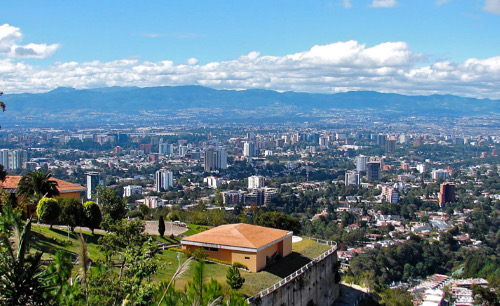Q&A: Friel prepares for service trip

Photo by Rigostar / Wikimedia Commons.
Bon voyage! The scene is set for the service group that plans to travel here, to Guatemala city. Although they may work in rougher spots, they hope to get to visit these beautiful locations.
January 12, 2019
In an exclusive interview, The Paw Print’s Anthony DiTomas sat down with science teacher Bob Friel about his summer trip to Guatemala.
DiTomas: Mr. Friel, I heard you were planning a service trip to Guatemala with some students from our school. Can you elaborate on that a bit?
Mr. Robert Friel: Sure we have two things going on. One is leading some trips locally in Northeast Ohio that look at some deeper issues of social justice such as homelessness or access to education and also some environmental issues. So hopefully we can have some students come in and participate in some direct service. Secondly there is a larger duration trip going down Central America this summer. From June 2-9 this year’s trip will be to Guatemala City where we will be working with a garbage dump community, with people who live in work right around these large dumps. We will be learning about the conditions that they would need to escape the current conditions. Also, we will be working with this the children to help with lessons teaching English and to work to maintain an environment so the kids can get out of that life. The point is as much to figure out how other people live and also the similarities of people outside of the US.
DiTomas: I think it’s really cool that you guys are opening up the Mayfield students to new parts of the world. So how did the idea of this trip come up?
Friel: It honestly came up in hearing about students interests, but also looking at the depth of service experiences they’ve been exposed to. Also, seeing that there are opportunities for students at other high schools and what they have been able to do. For example, where I went to high school there may be eight or nine different longer service trips in the summer. There weren’t these service opportunities for Mayfield students, or there wasn’t anything that in depth to let them really get out of there Mayfield bubble. I know some groups of students who had done things with a church group, but the intent of this wasn’t to make this a religious mission trip. I mean my hope was to have students of all backgrounds, and all ethnicities to be able to share these experiences. I saw the students at Mayfield with the desire and that they could benefit from these things. So that was really what prompted me to push forward with this.
DiTomas: It’s great to see these service opportunities coming to Mayfield. Was there a large initial interest for the trip and if so, what was the selection process like?
Friel: I talked during lunch periods just to gauge people’s interest and to really introduce both of those programs. With no commitment we had almost 140 students express at least an initial interest. After talking with the parents and looking at the commitments and timelines of those there were about 35 to 40 students who submitted a portion of an application for the Guatemala trip. The application process consisted of writing an essay elaborating on past service experiences and also about how the students would bring their reflections back to the Mayfield community to share. Really their internal desire is why they wanted to go. I mean the sad thing is we couldn’t take everyone this first year. That would be great to eventually expand and have more than one trip but that’s the nice thing about having the local Northeast Ohio trips, they are able to get involved in the community here if they still have that interest.
DiTomas: Sounds like you had some difficult decisions to make when it comes to selecting students. Obviously, you’re not working around the clock there, so what can you do in your free time?
Friel: I mean most of the time we will be working on schools, in terms of maintenance, building or teaching English but that’ll be more during the day from say 9 to 5. After getting back from that, there’s going to be some reflection and there’s going to be some journaling, and some group processing because sometimes it’s important to be able to share and figure out how other people are affected from community building and what is it like being introduced to these different cultures. I’ve worked outside the U.S. before and I taught for two years in East Africa and one summer I worked in El Salvador. The biggest thing is being open-minded and just figuring out that things are going to be different, people are going to dress different, and the food is different. Every trip, I’ve come away seeing that people share the same desires that we do. Even though they have a lot less money they have a happier lifestyle and their stress is not the same as ours. It makes me question why am I getting so hung up on certain things that get me down when they’re people that have way less that are just really appreciative of the simpler things in life. So I think every person that goes will take away something different, but I would imagine there’s going to be a common feature that the group will take away, that will hopefully impact and shape the way they look at the world and another.
DiTomas: From what I heard, it seems like you have a nice trip planned and you are really going to do some good down there so thank you for your time.





















































